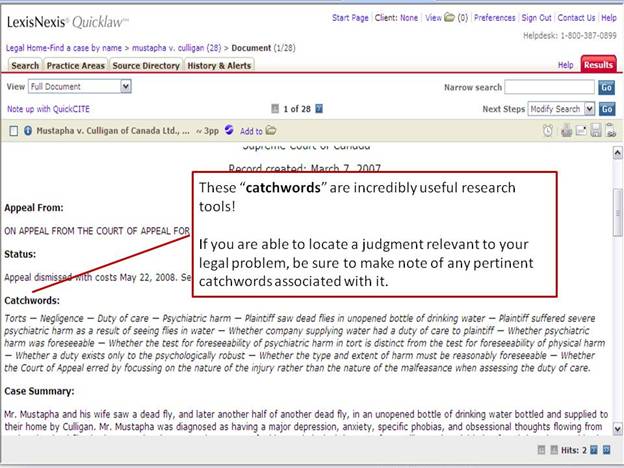Searching Using Keywords & Boolean Logic – Keywords: Defining Legal Concepts
Keywords are the search terms used to locate legal materials!
- A keyword search will retrieve documents and cases containing those words or phrases.
- They are used when conducting just about any type of search, including searches in paper sources.
- Think of keywords as terms used to define legal issues and concepts.
- Choose your keywords carefully so that they are neither excessively broad nor overly specific. Imagine that you are casting a "net" to catch relevant legal materials. If your net is not big enough, you will miss important information. But if it's too large, there will be too much to sort through!
Developing an effective search strategy
1. Start with factual analysis and issue identification, using a model such as FILAC
- We told you you'd be one step ahead!
- Consider the results of your analysis, and the relevant legal concepts and issues you have identified.
- Turn your mind to the issues and questions you are trying to answer.
2. Choose Keywords that Describe or Fit the Legal Concepts and Issues
- Try to select keywords that a court might use to express those same concepts and use.
HINT: Browse textbooks, legal encyclopedias, dictionaries, and other secondary sources to locate the legal expressions or terms of art that describe your legal concepts and issues. For example, by looking at a textbook on the topic of tort law, you will learn that the terms "tortfeasor” or "neighbour principle” can also appear in negligence cases.
HINT: Several "catchwords” and pithy phrases are included at the beginning of many court judgments; you should familiarize yourself with these catchwords since they are commonly used by the courts to describe legal concepts. See Fig 1.1
- Think about the keyword hierarchy! (below)
Fig 1.1 Catchwords

3. Develop Keyword Alternatives!
- Legal concepts and terms can be expressed in a variety of ways using a range of different keywords.
- Try developing broader or narrower terms. For example, instead of "marijuana" try "narcotics" or "illegal substance".
- Try developing synonyms and/or antonyms. For example, instead of "doctor" try "physician" or "medical practitioner".
CAVEAT: When devising new keywords, be careful not to lose sight of that "net" you are trying to cast and the question you are attempting to answer!
Catchwords & Keyword Hierarchy
Not all keywords are created equal!
Depending on the nature of the legal problem, certain keywords will be more important, relevant, or useful than others. This is particularly true when you do not use them in combination with each other.
EXAMPLE: Take the case shown in Fig 1.1 as an example. The catchwords are ordered hierarchically, from broad and general to narrow and specific:
- The first catchwords are "Torts”and "Negligence”
- These are Primary Keywords: fundamental concepts that express legal concepts in a broad and general way.
- "Torts" describes the area of law, "negligence" describes a sub-category of that area.
- The next catchwords are "Duty of Care" and "Psychiatric Harm"
- These are Secondary or Qualifying Keywords: qualifiers for the primary keywords. They identify further issue(s) or sub-issue(s).
- "Duty of care" denotes the legal issue at play within "negligence".
- To narrow the issue even further, "psychiatric harm" is included to give further context and specificity to the case and the issues.
- Finally, there are also other expressions such as "fly" and "water".
- These are Tertiary or Situating/Narrowing Keywords: words used to further situate or narrow the search. These keywords may be used to exclude undesired results, or to include specific facts.
These "catchwords” give you a good indication of the case content: it is a tort case, in which a negligence claim is being brought against a defendant who allegedly failed to discharge the necessary duty of care, thereby causing psychiatric harm to the plaintiff. The words "fly" and "water" reveal the specific context and circumstances of this particular decision.
When choosing and brainstorming keywords, you should try and classify them in a similar way, developing this type of "keyword hierarchy.” Remember that "net.” By using only primary keywords you will capture all the materials you need, but at the expense of capturing many more that are irrelevant to your specific, particular question.
On the other hand, if you adopt only tertiary keywords you will fail to capture some of the information pertaining to the broader legal issues, and return search results that have little to do with the area you are researching. Consider the above example. If you searched only "fly” and "water”, you would likely return cases relating to product liability or fishing. If you searched only "depression”, your results might concern the diagnosis of mental illness or worker's compensation. These decisions would offer minimal assistance to you concerning the elements of negligence or its applicability in the circumstances you are researching.
By combining primary, secondary, and tertiary keywords along the hierarchy you will have the best of both worlds and be able to conduct a more effective and efficient search. The primary words will cast the broadest net possible over the relevant areas, and the secondary and tertiary keywords will ensure that net shrinks to produce manageable and highly focussed results.
Once you've categorized your keywords in this way, you can apply your hierarchy to an actual search using Boolean operators and connectors.
